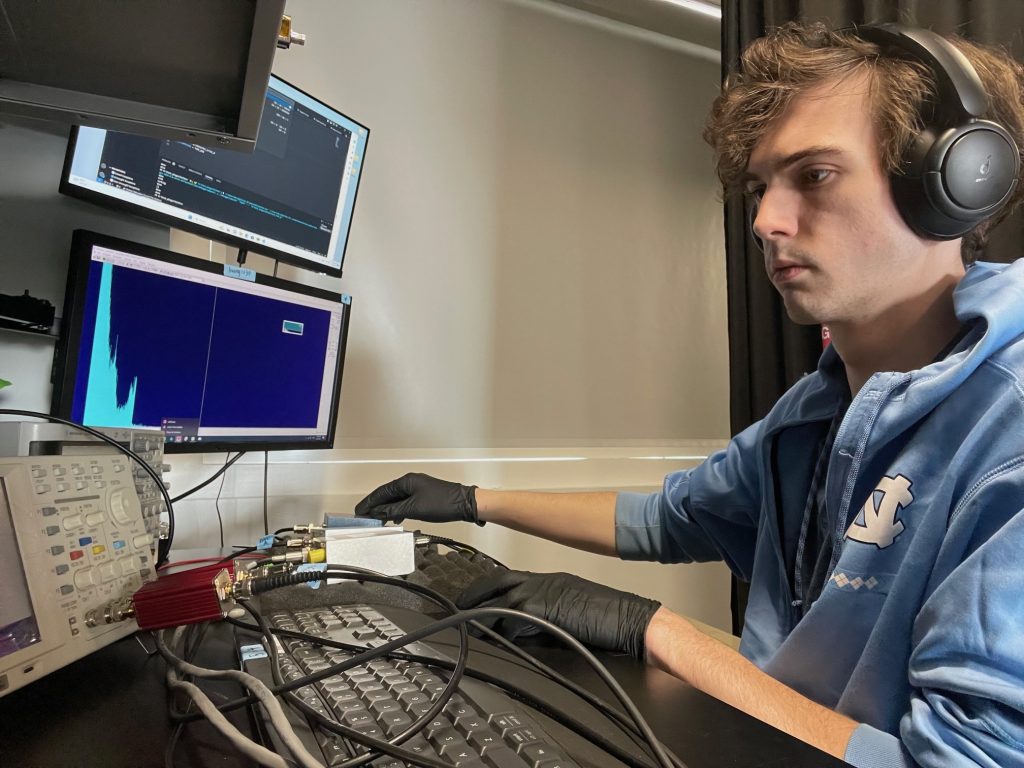
When Allen Wood, a materials science Ph.D. student in the department of applied physical sciences, was a boy growing up in Winston-Salem, he had preoccupations suited to someone much older. At the age of 8, he absorbed the contents of a book by Richard Feynman on quantum theory given to him by his grandfather.
At 11, Wood took the family computer apart, spreading its components throughout the living room floor, drawing a gentle rebuke from his father that it had better work when he put it back together.
At 15, during a neighborhood bicycle ride, he wondered how he could stay upright on two spinning wheels, prompting a fascination with a fundamental concept in physics called angular momentum, which describes the rotational motion of an object around an axis and explains the stability of a bicycle in motion.
“When I observe something and it seems counterintuitive, my immediate go-to is ‘what physics is at play here?’” he said.
So it seemed inevitable that Wood would graduate with a bachelor’s degree in physics with honors from UNC-Chapel Hill in 2021 and transition seamlessly into the materials science Ph.D. program the next year. Now in the third year of his five-year program, Wood is working in Jinsong Huang’s lab on improving the performance of radiation detectors using a special chemical compound, called perovskite, that increases the efficiency and reliability of solar cells. Last year, he received the Best Oral Presentation Award for his work from the Consortium for Enabling Technologies and Innovation.
The career paths for such a talented student are seemingly limitless — an academic appointment, research in a national lab, industry research — but for Wood, the plethora of options necessitated some hard thinking, which he was encouraged to do in two required applied physical sciences courses — “Resources for Success in Your Ph.D. Program” (MTSC 710) and “Developing Your Plan for Success” (MTSC 711).
In “Resources for Success in Your Ph.D. Program,” students are exposed to research and key resources and skills outside of course work that they will need to be successful in the Ph.D. program and beyond, and in “Developing Your Plan for Success,” students create an individual development plan that entails a critical self-assessment, revealing which careers make sense for them.
The individual development plan, said René Lopez, a professor and director of graduate studies, isn’t a static document. Students articulate their values and aspirations through a series of prompts and are encouraged to revisit the plan annually with their research advisor.
“We know that successful careers usually don’t happen without some planning and conscious effort,” he said. “Taking ownership of their path and tailoring the plan to their interests is the single most important element that makes a graduate student successful.”
When drawing up his own individual development plan, Wood discovered that he likes conducting basic research, working in a collaborative environment and teaching graduate students the concepts he has learned at the department of applied physical sciences — but not grading, which deemphasizes subjectivity in favor of a rubric.
“The MTSC 710 and 711 courses were invaluable because they made me think about what motivates me,” said Wood. “I’m clear now on the things I like to do day to day, but I’m still undecided on my career path, which I like to view as being given a lot of unopened Christmas presents. It’s exciting to think about what might lie ahead.”
By the Department of Applied Physical Sciences
